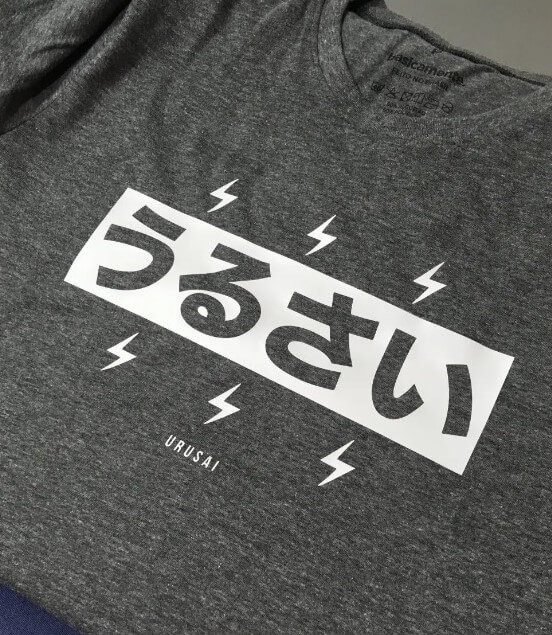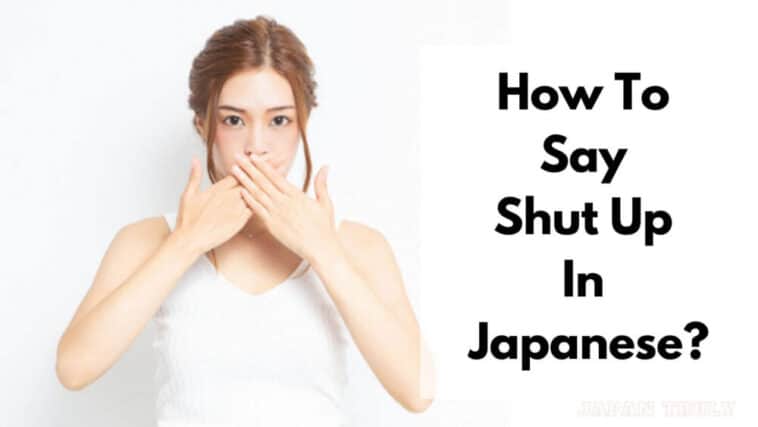Want to learn how to say Shut up in Japanese? Check out our article below where we’ve listed and explained some of the ideal Japanese phrases to tell someone how to wrap it up!
Sometimes, knowing how to express annoyance or ask for silence in another language can be useful. Discover the Japanese phrase for ‘shut up,’ its appropriate usage, and cultural nuances. Learn how to navigate such expressions respectfully while understanding the context of communication in Japanese culture.
Page Contents
How To Say Shut Up In Japanese
To say “shut up” in Japanese, you can use the phrase “うるさい” (urusai) which means “noisy” or “loud.” However, it can also be used informally to tell someone to “shut up” in a rude or harsh manner. It’s important to use this phrase carefully, as it can be considered impolite.
- Related: Ways to Say You’re Welcome in Japanese
- Related: How to say Happy Birthday In Japanese
- Related: How To Say I Love You In Japanese
Different Ways To Say Shut Up In Japanese
As we mentioned above, there are different words and phrases that can mean Shut up in Japanese, some more formal than others. Let’s take a look at these words and phrases below.
Urusai (うるさい) – Shut Up

Urusai is one of the common ways to say shut up in the Japanese language and it’s written in kanji characters asうるさい. Urusai is a flexible Japanese word that can either be used in serious or playful contexts.
This means that Urusai can be mostly used on casual and informal occasions and it doesn’t carry a harsh meaning or tone when said.

You can use Urusai when you’re with your close friends, relatives, or colleagues if you think they’re being too loud.
For eg – When you’re doing an important task and some of the people who’re close to you happen to annoy you, you can tell them “Urusai yo” (るさいよ) which can either mean “shut up” or “leave me alone”.
Damatte Kudusai (黙ってください) – Please Shut Up
Damatte Kudusai is another popular Japanese phrase that most of us are aware of, and it’s one of the phrases frequently used by non-Japanese speakers as well. The English translation of Damatte Kudusai is “Please Shut Up”.
Since “Please” is a magic word that’s mostly used to sound polite, “Damatte Kudusai” is a formal way of asking someone to quieten up.
For instance, if you see a random person who’s too quiet in public places you can tell them “Damatte Kudasai” in a soft tone to not sound too aggressive.
You can even tell your noisy neighbors who are generally loud most of the time to Damatte Kudusai too. Damatte Kudasai is a phrase that can even be jokingly used between friends and close family members as well.
Damare (だまれ) – Shut Up / Shut The Hell Up
Damare is one other Japanese word to say Shut up and it’s written in kanji characters as だまれ. Damare is one of the extreme ways in Japanese to say someone to shut up and it’s considered informal and rude.
When translating Damare to the English language it can literally mean “Shut the hell up” and it’s only used by someone when they’ve reached their extreme point in anger.

In addition, the word Damare is most likely used by someone to express their anger or scorn at a person rather than the situation that causes the anger itself.
For example, you see a person you dislike and he/she screams at top of their voice which can cause you to say “Damare” or maybe you’re sleeping and the construction workers are being too noisy and then you tend to use the word Damare.
Damare is a word that must only be used when you’re extremely fed up with the situation. Since it’s a strong word, using it regularly can bring you trouble.
Shizuka ni Shite (静かにして) – Be Quiet
Shizuka ni Shite is a Japanese word that can be used as a substitute for telling someone to be quiet. This Japanese phrase is written in kanji letters 静かにして and it’s one of the formal ways to say shut up in Japanese. When translating Shizuka ni Shite to the English language it means “Be Quiet”.
Since Shizuka ni Shite is just a formal way to say someone to be quiet and it doesn’t necessarily carry the connotation of shut up like Damare and Urusai. It’s an ideal Japanese phrase to use in public places where there are strangers who can be noisy.
Shizuka ni shite is pronounced as “Shizuka ni shte” and the letter “I” isn’t pronounced since it’s silent. If you want to sound more polite while saying “Shizuka ni shite” you can say “Shizuka ni shite kudasai” which means “Keep quiet, please”.
- Related: Meaning Mono and Koto in Japanese
Anata wa urusaidesu (あなたはうるさいです) – You Are Loud
You don’t have to necessarily say “Shut Up” to tell someone to keep quiet, in fact, there are several nice ways to tell someone to keep quiet.
One more polite way to say shut up in Japanese is by saying “Anata wa urusaidesu” which is basically a sentence and it’s written in kanji characters as あなたはうるさいです. And when Anata wa urusaidesu is translated to English it means “You are loud”.

Since Anata wa urusaidesu means “You are loud” it’s a formal way to ask someone to be quiet by telling them they’re being noisy.
In addition, the phrase Anata wa urusaidesu uses the word “Urusai” as a root word and as we mentioned above Urusai can either be used in formal or informal contexts.
Shizuka ni (静かに) – Be Silent
Shizuka ni which is written in kanji letters 静かに and when translated to the English language it means “Be Silent”.
From the meaning of the phrase, we can comprehend that “Shizuka ni” is just another alternative way to tell someone to shut up formally in Japanese. This is a phrase generally used by teachers at school when they want the kids to settle down.
Shizuka ni is predominantly used in formal contexts hence it can be used in public places, with strangers, and basically with anyone you may or may not know personally but only if they’re being loud.
However, it’s ideal to use Shizuka ni at a place where people are too crowded and loud such as at an event, meeting, festivals, etc.
When And When Not To Say Shut Up In Japanese?
Let’s admit it, Shut up is definitely a phrase that shouldn’t be used regularly due to the offensive tone it carries yet we still can’t help ourselves but use it to express how loud or annoying someone can be.
However, the Japanese aren’t known for being outright expressive especially when they have to correct someone because they’re thoughtful people and wouldn’t want to hurt others’ feelings.
Yet there are circumstances where they have to use shut up to lower someone’s noise, therefore let’s look at instances when and when not to say shut up in Japanese.
- With Strangers – It’s acceptable to use shut up with strangers, however, with strangers you must ensure to be respectful and calm when doing so. The ideal Japanese words and phrases you can use to mean shut up are Damatte Kudusai, Shizuka ni Shite, Shizuka ni, and, Anata wa urusaidesu.
- With Close Friends – Since your close friends are those who understand you, you can use any of the Japanese words and phrases that mean shut up we’ve mentioned above. Generally, words and phrases like Damatte Kudusai, Damare, and Urusai are the ones frequently used among close friends.
- With Relatives – It’s a big no to use offensive Japanese phrases like Urusai, Damare, and Damatte Kudusai with relatives especially if they’re older than you. You can tell them Anata wa urusaidesu which means “You are loud” however it’s best to refrain from silencing any of your relatives with any phrases or words.
How do you say please shut up in Japanese?
Damatte Kudusai which is written in kanji characters as 黙ってください and it means “Please Shut Up” in the English language. Damatte Kudusai is a formal and polite of asking someone to shut up or be quiet in Japanese.
Does Urusai mean shut up?
Urusai is a Japanese word that means shut up in the English language. It’s a popular word used in manga and anime to tell someone to shut up. Urusai is a casual word that can be used in serious and/or playful contexts as well and it doesn’t carry a negative connotation.
Is Damare rude?
Damare is Japanese for Shut up or Shut the hell up and it’s written in kanji letters as だまれ. Damare is mostly used on informal occasions, especially between close friends. In addition, Damare is also a word that can be used to express disgust at a person. Since Damare has an offensive meaning, it’s considered impolite to use it regularly.





